Fate/stay night: Unlimited Blade Works(TV)
Short Synopsis: Our heroine is a plucky magician who summons a wise-cracking familiar.
Ninjarealist’s impressions: The much hyped Ufotable TV adaptation of Fate/stay night is here and let’s just get the big questions out of the way right up front: yes, the first episode lives up to the hype and no, this show is not for people who are unfamiliar with the Fate franchise. So if you haven’t seen the first adaptation, or the prequel, then you might as well just stop reading now. That’s not to say you might not get something out of the show, but the biggest failing of this adaptation is that it’s just not very accessible to newcomers. Events and characters get thrown at you so fast that you’ll have a difficult time following along if you don’t have a basic idea of the plot already.
Fate/stay night: Unlimited Blade Works really succeeds in all the ways you would expect from a Ufotable adaptation of a TypeMOON property. The animation is gorgeous, though I found myself less impressed with the flashy special effects and more impressed with the small details, like the hammers on Rin’s alarm clock or Archer absent-mindedly playing with a pendulum in the Tohsaka study. These small touches really go a long way in enhancing the atmosphere of the show. There are some noticeably horrendous textures that become especially obvious in a few scenes, but overall I was struck by how many of the visuals, especially the indoor vignettes, reminded me of still images from the visual novel. It’s not just a good-looking adaptation either: I like the script. Rin has never been more likable and Archer is wittier than ever. Their antics repeatedly made me chuckle and play out almost like an 80’s buddy-cop movie. I think a lot of why the dialogue works so well is the consistent pacing. On the other hand some aspects of the show did feel overwrought. The characters, while endearing, are prone to rattling off extended monologues that often feel a bit hamfisted. The Hideyuki Fukasawa score isn’t bad but honestly, the best parts of this episode are the parts with no music at all. I hope that in future episodes this show uses a little less music. This is especially problematic in the fight scenes, which do feel a little bit overdone, a feeling that is only enhanced by the epic, orchestral, score. Still, this is a quality adaptation that manages to hit most of the right notes. It’s hard for me to see fans of the franchise being disappointed by this. My biggest criticism is that it’s just not very accessible to everyone else.
Potential: 75%
Akatsuki no Yona
Short Synopsis: The protagonist is a princess in a “Romance of the Three Kingdoms” style fantasy setting.
Ninjarealist’s impressions: Like many anime fans on the internet, when I first saw the preview for this show I was reminded of another Studio Pierrot series, The Twelve Kingdoms. I’m a big fan of that show and from the classical Chinese setting to the red-haired protagonist, Akatsuki no Yona seemed almost like it was inspired by that venerable series. Alas, appearances can be deceiving. Beyond the superficial similarities Akatsuki no Yona doesn’t feel anything like The Twelve Kingdoms. If anything, it feels more like an adventure series in the mould of Full Metal Alchemist or recent Studio Pierrot-influenced product The Legend of Korra. That’s not necessarily a bad thing and in a lot of ways Akatsuki no Yona seems to be getting this formula right. Yona manages to be a surprisingly likable character and her banter with the other characters actually made me chuckle pretty consistently. The audio/visual presentation is extremely good with a very solid performance by Chiwa Saito as the lead. Still, while this show seems to have a lot of the elements of a good series, it feels kind of soulless so far. The thematic content is pretty shallow and the aristocratic setting is lacking in any sort of grit to make the world feel lifelike. Then again, the show clearly has a lot of ground to cover, so I wouldn’t be surprised if we get more of that later on. But a bigger issue for me is the direction. While the individual shots look great, the pacing feels a little too convenient. Characters always show up exactly when you would expect them too and dramatic moments unfold in a way that feels a little too scripted and artificial for me. Contrary to what you would expect from the first episode in an adventure series, there isn’t much action and the action we do see is not particularly well-choreographed. It’s unclear to me whether this will change later in the series. Lack of action isn’t usually a bad thing, but if the narrative and thematic content continue to be so weak then I can’t see them carrying the show. Akatsuki no Yona does have most of the elements of an entertaining adventure series and I think it will be a modest success if it goes that route. But if the show is trying to be something more serious I’m not encouraged by this first episode.
Potential: 50%
Orenchi no Furo Jijou
Short Synopsis: Our protagonist has a cute merman living in his bath.
Ninjarealist’s impressions: I’m a big believer in short comedies. Teekyu and Poyopoyo are some of my favorite shows in recent memory, and they really demonstrated why the short format works so well for humor. A common problem with full-length comedy series is that the first episode will use up all the jokes and the rest of the series goes downhill from there. This doesn’t happen as often with short comedies because they’re over so quickly that there just isn’t enough time to use up all the jokes. It’s clear after the first episode that Orenchi no Furo Jijou still has a lot of cards in its hand. So far the series has barely scratched the surface of what a high-school aged boy and his handsome, physically-affectionate, merman friend might do together in a bath. The first episode was surprisingly funny. The Merman, is just completely, over-the-top, ridiculous, both in appearance and personality. This is accentuated by his seiyuu, rookie Yuuichiro Umehara, whose voice manages to be both deep and effeminate at the same time. Seeing him tease the deadpan protagonist was funnier than I expected it to be. Still, as many joking anime viewers have pointed out, this show is essentially Free! in a much smaller pool. It’s a cute guys doing cute things show. That’s not inherently a bad thing, but it doesn’t usually make for the most interesting viewing. The hilarious OP, and the sheer absurdity of the premise, both seem to suggest that this show might be a parody, and I do like parodies, but I’ve been burned too many times in the past by comedies that promise parody and just fail to deliver it. I can’t recommend this show to anyone but serious slice-of-life fans.
Potential: 35%

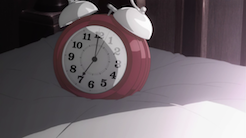
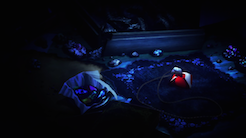
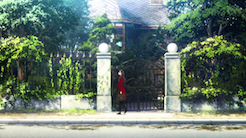
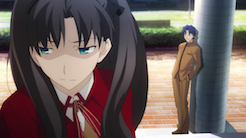
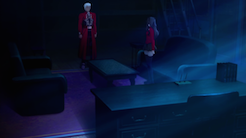
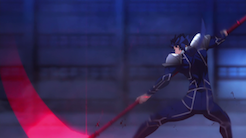
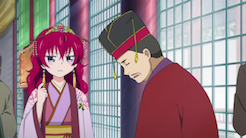
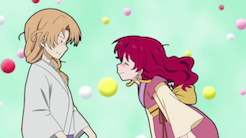
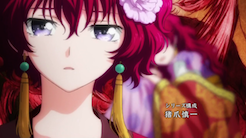

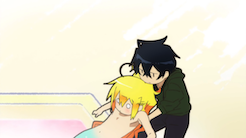
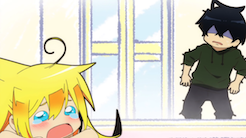
They don’t even try to hide it. Both the deadpan MCs from this anime and Free! has the same seiyuu.
I could be wrong but the setting is more Korean than Chinese.
I can see that. The names do sound extremely Korean and the topography of Kouka does look a lot like Northern Korea. I called the setting Chinese just because I think it has a vaguely continental flavor. Of course, other aspects of the setting seem much more Japanese.
It’s sort of a generic East Asian setting, but the country of Kouka itself I would say is specifically Korean. The clothing is more like hanfu for the most part (aside from the female servants in the background who seem to be wearing hanbok), but I know Hak’s clothes closely resemble those of a character in a sageuk. There are their names of course, but I think what’s most telling is that the dragons have four claws. Generally speaking, Chinese dragons have five claws, Korean dragons have four, and Japanese dragons have three.
That’s really interesting. Thanks for the lesson in East Asian culture/history. I actually studied East Asian History in college but lots of nuances like this are still lost on me. I really appreciate when other people point out the subtle little things that anime staff put into their shows. It makes you realize how much thought goes into producing these shows. And now I can feel confident in describing the setting of this show as inspired by Korean history. I will have to read about those styles of clothing you mentioned to get a better idea whether the setting is based on a specific period in Korean history (or maybe you can answer this question).
Fate score is not Yuki Kajiura!
The information that I found online was conflicting. It does seem like Yuki Kajiura was involved with the music but someone else is listed as the score composer. I edited the review to reflect that.
I’m liking the dual first impressions! Psgels, I’m really glad you’re writing again and have found others who can make thoughtful contributions. Can’t wait to read more, since this season seems to have a lot of potential… famous last words, huh?
About Fate/stay night not being accessible to newcomers. I wouldn’t pass that judgment just yet. The original VN also started that way, throwing a lot things unexplained to the readers and just latter slowly introducing them properly.
As far I can remember, this first episode (and the following one) are remarkably similar to the source. I doubt new viewers will be that confused.
Fate/Stay would be better if some of the fighters like Assassin, Rider, or Lancer actually have a chance of winning.
Archer is ALWAYS totally overpowered in the series.
Wait for Heaven’s Feel.
I think it happens to be luck of the draw. Tokiomi and Kirei were working together from the start so Gil had a heck of an advantage. He also got to see Rider’s ultimate move first so he knew exactly how to deal with it. I mean, Shirou managed to beat Gil in a hand-to-hand sword fight. Where the heck was Ea there? As for the other Archer, he has versatility and survivability but i don’t see him as overpowered. He wasn’t quite able to beat Berserker, for instance, seemed to be at something of a disadvantage against Saber and drew against Lancer.
At least the mage characters in the Fate/Stay series have potentially game breaking abilities.
I have an interesting point on your criticism of the music, but first, to clarify, the music is being composed by Fukasawa and Kajiura Yuki is supervising the music and how it’s played. You will likely hear the influence of both musicians in the music. Now, Kajiura Yuki is the one in charge of decisions like what kind of music is to be played, when it should be played, and how it’s played. She guides the composer without composing the music herself. Most of the time, this is either the job of the sound director or the composer them self, but the work is split here, so assuming the job is as usual, that’s what she’s doing.
For my point, though, one thing that musicians who write for screenplays have to recognize is when to play music in the background and when NOT to have music play in the background. According to what Kajiura Yuki has said in the past (when working on Madoka and Fate/Zero, specifically), she has to take into consideration the fact that music, in general, influences the audience. If you want the audience to feel uplifted during a scene, the music is there to help create that atmosphere. If you want the audience to feel a gradual shock, you compose the music in that direction. If there’s a scene when the scene itself directs the atmosphere and any sort of music might cause misinterpretation or conflict with the scene, there should be an absence of music or a very background-esc, non-influential track, and even then, it can only be in certain situations where the absence of music is more of a problem. So a lot of the music-less scenes ARE deliberately music-less. The soundtrack was made with the screenplay in mind (especially for the first several episodes), so the tracks are not just made and fit to the scenes they fit with. They’re composed with the scenes in mind and made at will. This may change later in the series, though, since much of the anime still hasn’t been completed, but it’s also possible that the screenplay for some of the latter half of the series isn’t completely done yet and they can even create new tracks on demand while it’s being animated–as Kajiura Yuki is used to doing with most of the stuff she composes for.
My biggest criticism is that it’s just not very accessible to everyone else.
Actually, I have to wonder how a newcomer, or even someone coming from Fate/Zero who’s never touched other Fate material will take this rendition. The infodumping has to be for their benefit. For instance, I wonder how many newcomers caught the heart pendant switch. That was a really nice touch.
I actually have a spoiler request for people in the know about Episode 0. I hope someone can answer. [SPOILER ALERT]
.
.
.
Episode 0 has an incident where Rin opens up Tokiomi’s box only to find the pendant and a broken catalyst. Somehow, opening the box seems to screw up the clocks. This is the part I don’t understand. What causes the clocks to turn backward? I think that catalyst is the one Tokiomi used to summon Gil. Is that what caused it?
Also, that pendant I could have sword I remember Tokiomi giving it directly to Rin in a flashback. I’m not sure if it was from the movie or novels or Studio Deen’s Fate route. Which is the most faithful to the novel?